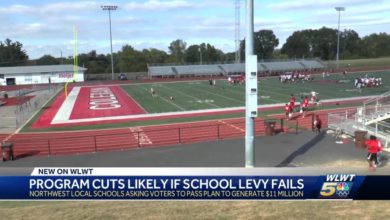
Billie Tingle has learned from her mistakes.
And she has the state of Mississippi to thank for that.
Tingle is among the dozens of higher education faculty there who have since 2016 received state-funded training in the Science of Reading. For Tingle, the training on how the brain learns to read was a "life-changing" epiphany.
"When I was training to become a teacher, where was this information? And then working through my master's — where was this information? ... Why am I just now finding all this out?" Tingle, an associate teaching professor at the University of Southern Mississippi, recalled thinking.
Today, Tingle uses the training to guide her own classes full of future teachers.

James Edward Bates/Special to The Courier Journal
"It became this responsibility, really. The responsibility of, I've got to make sure that my teachers are going to be ready on day one," she said.
Experiences like Tingle's have fueled Mississippi's nationally celebrated reading growth and provide a window into what is possible for Kentucky.
The potential solutions touch all sides of the issue, from district superintendents and school boards, to higher education faculty and the Collaborative Center for Literacy Development, to the Kentucky Department of Education, the Kentucky General Assembly and the state's teachers unions.

School districts' main priority should be making it easier for teachers to implement the Science of Reading in their classrooms, experts told The Courier Journal.
That involves taking a hard look at what other responsibilities or initiatives districts have assigned to teachers, said David Paige, director of the Jerry L. Johns Literacy Clinic at Northern Illinois University.
"Teachers get beaten down by the various initiatives that come and go...," Paige said.
"It's kind of like Thanksgiving dinner: 'Hey, my plate's heaped.' But grandma's there, 'Oh, you've got to have some of this.' Well, I need to take something else off my plate. Oh, no, no, it just gets plopped right on top of what's already there. And that's what we tend to do with teachers," Paige said.
One area local districts could first scrutinize, experts said, is how they are using professional development time already built into their school year calendars.

Matt Stone/Courier Journal
Laurie Bottiger, head of the de Paul School in Louisville, a private school for children with learning difficulties, has seen targeted professional development in the Science of Reading have a direct impact on her students' learning.
"These kids deserve every expertise in teaching, so that they can be the strongest learner possible," Bottiger said. "And how you do that is by investing in the teachers with professional development."

Tingle knows the confusion teachers face. Even their college textbooks can contain mistruths.
"They would say there are hundreds of different ways to teach children to read. All you need is your own classroom, you're gonna get to know your students, and things like that," Tingle said. "And no, that is not true. There are not hundreds of different ways to learn to read."

James Edward Bates/Special to The Courier Journal
The lack of knowledge about reading science was leaving new Mississippi teachers in the lurch, Tingle said. Once in classrooms, many were turning to online resources that may have been "cute," but lacked any scientific basis, she said.
The same is happening in Kentucky.
A new law passed during the 2022 General Assembly could prove critical in getting science-backed reading instruction into all Kentucky schools. Under the new law, local school boards have authority over schools' curricula, decisions that had previously been managed by Kentucky's school-based decision making councils (SBDMs).
If school boards will now be directly influencing reading instruction, they, too, need training in the Science of Reading, said Kymyona Burk, former state literacy director at the Mississippi Department of Education.
BARBARA GAUNTT/CLARION LEDGER
"We need our district leaders and our school boards to also be very aware of what works and what doesn't, so that they can make the best decisions," Burk said.
Still, experts agree the fastest way to improve reading instruction isn't to buy new curriculum. It's training teachers in the Science of Reading — a process that, in reality, isn't that fast.
Tingle is now an official trainer for Language Essentials for Teachers of Reading and Spelling, or LETRS.
The Kentucky Department of Education started offering LETRS training to elementary teachers this school year. Training will take two years.
Some local school boards in Kentucky have chosen to use pandemic relief funding to provide teachers with stipends to compensate for their time out-of-school spent on the intensive training.
Louisa Moats, the co-creator of LETRS who has since sold the program, has seen states like Mississippi take an aggressive approach in getting all of their K-3 teachers trained in reading science. In Kentucky, LETRS training is optional.
"It's not a question anymore about what we ought to be doing," Moats said.

There's one element of Kentucky’s literacy law that gives science-backed reading advocates hope.
By 2024, all new teachers seeking early childhood or elementary teaching certification must pass a test on reading instruction.
The new mandate was modeled after a similar requirement in Mississippi’s 2016 updated literacy bill — one that’s making a tangible difference in the Magnolia State's classrooms, Burk said.
A pass or fail on the certification test “directly reflects how well you've prepared the candidate,” Burk said.
Changing Kentucky's teacher training programs could be accelerated by a state-funded external review of the programs' course offerings, syllabi and instructional materials, those involved with Mississippi's literacy turnaround told The Courier Journal.
Mississippi contracted with the Jackson-based Barksdale Reading Institute to conduct its review. Barksdale published an aggregate state report but agreed to keep individual school reports confidential. There was no scoring or ranking.
"We were not out to expose anybody," said Chief Executive Officer Kelly Butler. "Our goal was to see where the gaps are and what needs to be filled."

The Collaborative Center for Literacy Development based at the University of Kentucky is tasked by law with providing teachers information and ongoing training about evidence-based reading practices.
CCLD has not been meeting all of its statutory mandates, The Courier Journal found. Its director has publicly opposed efforts linked to the Science of Reading movement.
"In the current situation, CCLD is showing me they're really not very supportive," said Rep. James Tipton, R-Taylorsville, a co-sponsor of Kentucky's 2022 Read to Succeed Act.

Jeff Faughender/Courier Journal
"I think they know that we have a lot of concerns about how they're operating, and the lack of accountability for the work that they're doing," Tipton said.
According to a recently released technical report, the Kentucky Department of Education is now requesting the center take certain steps to meet its statutory requirements during 2022-23. Much of CCLD's action plan, however, resembles what the center had already been doing.
Tipton said it might be time to look at which public university houses CCLD.
A comparable state-funded math center is currently based at Northern Kentucky University. But it's not a guarantee it will stay there. That's because the statute creating the center requires the state to issue a new application for the center's home base every five years.
That is not the case for CCLD, which has been based at UK for more than two decades.

James Edward Bates/Special to The Courier Journal
Another area of concern for Tipton and his co-sponsor of the literacy law, Stephen West, R-Paris, is CCLD's annual evaluation of the state's $15 million Read to Achieve grant program. There has been little study of the program's long-term impact.
CCLD contracts with the College of Education Evaluation Center at the University of Kentucky for the annual evaluations. Director Shannon Sampson said the availability of longitudinal reading data is one of the issues hindering the center from studying the long-term impact of the grant program.
State assessment changes and the cancellation of testing in 2020 because of the pandemic have also played a part, Sampson said
The evaluation center is now in talks with the Kentucky Department of Education about conducting a long-term study.

Changes are already underway at the Kentucky Department of Education, which hired its first early literacy director in July.
KDE also is in the process of providing Science of Reading training to more than 2,000 educators across the state.
Yet experts who spoke with The Courier Journal questioned whether Kentucky's education department could be doing more to correct course in the state's reading instruction.
There has been no data collected, for example, on the types of reading curricula and instructional materials being used across the state.
Other states have gone as far as banning curricula and associated teaching strategies that do not follow the brain science behind reading.

One place Kentucky's General Assembly went wrong, according to former Education Commissioner Wayne Lewis, was its 2017 decision to dismantle a statewide teacher evaluation system.

Michael Clevenger/Courier Journal
Lawmakers scrapped the system in an omnibus education bill. The system would have allowed state officials to analyze how well educator preparation programs are preparing future teachers to teach reading, Lewis said.Kentucky instituted a full-scale evaluation system in 2014, around the same time neighboring Tennessee implemented a similar one. But unlike Kentucky, Tennessee has stuck with it.
After leaving the Kentucky Department of Education in late 2019, Lewis became dean of the education school at Belmont University, a private Christian university in Nashville. (Lewis is now president of Houghton University in upstate New York.)
At Belmont, Lewis had access to Tennessee's teacher evaluation system, which allowed him to track how his graduates were doing once they fanned out into classrooms across the state. He had access to student test scores, as well as principal evaluations. If he saw a trend in scores or principal feedback, he could adjust the college's programming, Lewis said."Had Kentucky continued down that track, Kentucky would be able to do that, too," he said. "But we went the opposite direction."
Another area to reconsider, experts said, is the language in Kentucky's 2018 dyslexia law.
Unlike other states in which dyslexia screening is mandatory, Kentucky's law made it optional.
More than four years later, only one school district has opted in.

It remains unclear what role Kentucky's teachers unions will play in the state's future literacy plans.
The Kentucky Education Association and the Jefferson County Teachers Association lobbied against both the 2018 dyslexia law and the 2022 Read to Succeed Act. They also supported the dismantling of the teacher evaluation system.
KY 120 United, an affiliate of the American Federation of Teachers, is another union in the state. One of its members, Claire Batt, who served on the Kentucky Board of Education from late 2019 to April 2022, said: "We take the position that instead of adopting an extreme view of literacy instruction, we should consider adopting a more centrist policy based on effective literacy practice.
"Unfortunately, the Read to Succeed (Act) reflects the 'one-size-fits-all' Science of Reading and LETRS approach to literacy instruction that lacks the research base showing strong effect on reading achievement," Batt said, referring to a federal research database on instructional strategies and programs.
LETRS training currently is not in the database.
Oakland-based national literacy advocate Kareem Weaver questioned the focus of Kentucky's Science of Reading debate.
"It seems to me that this is a political problem, way more than it's a science problem or a pedagogical problem or even an educational problem," Weaver said.

Butler, of the Barksdale Reading Institute, cautioned Kentucky leaders about how difficult sustained change will be.
"I think we made a dent (in Mississippi)," Butler said. "My biggest regret is that the academic law of freedom is kind of a firewall.
"Even if you change licensure and tell a university you must teach this, if the faculty don't know how or don't want to, they don't have to. Their syllabus gets approved, but they just keep on teaching what they want to teach."

James Edward Bates/Special to The Courier Journal
Tingle, the USM professor, has experienced the challenge firsthand.
When in a past semester another USM professor instructed Tingle’s students to write about their philosophies of teaching, they came to Tingle for help.
"I flat out said, 'No, I will not help you with your philosophy of education, because I really don't care what your philosophy is.'
"'What I care about is: Do you know the science?'"
Mandy McLaren: 502-582-4525; [email protected]; Twitter: @mandy_mclaren.







